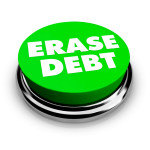Eliminating all non-mortgage debt should be one of your top financial goals
A lot of debt spells disaster for most people’s financial plans, and it should be avoided at all costs. These are the top 8 reasons why having a lot of debt can be harmful:
- Debt works against wealth building: High interest loan payments enrich lenders at the expense of the borrower: lenders get wealthy, but you don’t.
- Debt adds to stress: People with a lot of debt have much more stress compared to those who don’t; they are unhappier and they enjoy life less with debt.
- Debt subtracts from life’s enjoyment: If you’re making a lot of debt payments, your disposable income will be limited, and you will have less money to save or to use for having fun.
- People with a lot of debt worry more: High debt people live a stressful paycheck-to-paycheck existence, never knowing if they will have enough money each month to cover their bills.
- Increased financial difficulty: Debt is the number one reason people state for having financial problems.
- Less prepared for emergencies: Big borrowers don’t have emergency cash, and things such as big car repair costs or health care bills increase debt and stress.
- Spend more: Most people who carry large credit card balances are less frugal, and they are less careful comparison shoppers.
- Earn less: Financial stress is the number one reason employees perform poorly at work, leading to lower incomes.
How to get out of debt: Eliminating debt should be deliberate, and it should be tackled with enthusiasm so that you can quickly break the spending and credit habit. These are the top 9 ways to get out of debt:
- Accumulate $1,000 in savings for total emergencies, for things such as major car repairs or trips to the emergency room (not for ordering pizza). This allows you to avoid using credit cards when an unplanned expense pops up.
- Snowball your debt. With this technique you first pay only the minimum payment on each debt account. Then take all of your disposable income and add it either to the highest interest account or to the lowest balance loan for the feeling of success when accounts are repaid 100%. When one debt is eliminated, your monthly debt payment shouldn’t decrease, but you should use the payment from the paid-off debt toward the next unpaid debt on the list, continuing this method until all debts are repaid. eFinPLAN has a debt acceleration tool to help you get out of debt.
- Create a budget, track spending, and reduce spending on entertainment, eating out, vacations, and groceries.
- Get a second job, because a second income can go a long way to helping you pay down your debt. Devote 100% of your new income toward debt reduction.
- Freelance if you have a marketable skill, and use the income you derive to pay off debt as quickly as possible.
- Downsize by purchasing a smaller, less-expensive home and car if you can do so without spending cash today or incurring more cost over the long-term.
- Temporarily stop 401(k) contributions and direct 100% of the redirected funds to paying off debt.
- Sell stuff. Start by cleaning house and selling items. Use the cash from the sales to repay debt. You might miss some of your favorite things, but when you are debt-free you can easily buy them in a few months, if you still want them, by using your previous payments that used to go to debt.
- Consumer Counseling Agencies: If you are so deep in debt that you can’t even make minimum payments, start by trying Dave Ramsey’s pro rata debt repayment plan. Some people have success with special companies designed to help with repayment. I only occasionally favor agencies that can negotiate terms with lenders and establish repayment plans for a very small fee. However, I am not in favor of credit negotiation firms that charge healthy fees to negotiate a lower payoff. There has been some fraud in this industry. Therefore, research agencies extensively, know all the pro’s and con’s before signing, and look for several industry accreditations. Using these agencies is often considered a last-ditch effort to avoid bankruptcy.
Summary: Having a lot of debt is one of the top major obstacles to financial success. Commit to getting out of debt and you will improve the quality of your life!
This is the 2nd article in a 3-part series on debt. Please read all of these article to be a better user of it, and for ways to avoid and escape it.










